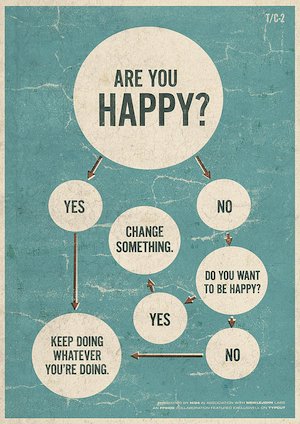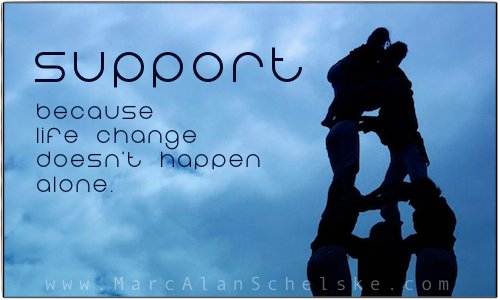The good news: You want to change and grow. You have a vision for your life. You want to break bad habits. You’re thinking about it. Maybe you’ve read a few books. You’ve started looking for resources. Maybe that’s why you’re reading this post.
The bad news: You won’t change.
Not if you’re normal. In the first post in this series I shared the sad statistic: 90% of heart disease patients diagnosed with early-stage heart disease never make the changes they need to stay alive. And that’s when death is on the line!
No wonder most New Year’s Resolutions are abandoned by February.
Breaking bad habits is hard. The odds are that you won’t change. Not unless you engage three very powerful factors. Bring these three things into your life, and change will happen.
The first factor is Unreasonable People. You need to build a new emotional relationship with a person or community who inspires and sustains hope. (More on that here.)
The second factor, and subject of this post, is what happens next. Once you find this inspiring relationship with a mentor or community, then you begin taking small do-able steps.

In his book Change or Die, Deutschman named this second factor “Repeat.” His definition: “The new relationship helps you learn, practice, and master the new habits and skills that you’ll need.”[note]Deutschman, Alan (2009-10-13). Change or Die (p. 15). Harper Collins, Inc. Kindle Edition.[/note]
Learning is an essential part of any kind of life change. But this is a particular kind of learning. Book learning doesn’t break bad habits. It’s practical learning. It’s experiential. Most importantly, it’s learning guided by someone who offers hope and has real experience.
Why Not Change Alone?
If you’re like me, you probably like the idea that you are strong enough and smart enough to make changes on your own.
Learn the right information. Practice the right skills. Shift your priorities. You can do it! I love that thought, and spent the first 40 years of my life living way. It works great when you need to learn a new method or gain some new information.
But it doesn’t work well when you need to break bad habits. The patterns in your life that you want to change exist for a reason.
You’re it.
You’ve chosen to cope in a certain way. You’ve become the kind of person that has that kind of relationship. Every bad habit you want to break you earned. Your life is not an accident; it’s the result of choices you’ve made.
In at least one important way you are the least qualified person to change your own habits. You built them. There is something deeply satisfying to you about them, otherwise they would not have become habits. In order to break bad habits, you are going to need to build good ones.
This isn’t just about doing things differently. It’s about literally re-wiring your brain.
Changing is Hard Because of the Re-Wiring
In simple terms your brain is a network of electrical connections. Each thought, memory, or action happens because an electrical signal travels down a specific neural pathway. The more frequently you call up that memory, or take that action, the more powerful that pathway becomes.
This is why breaking bad habits is so hard. The neural pathway wired to that action is deeply rutted and wide. Like water flowing downhill, it’s easier for your brain to go down that same old path.
So, in order to break a bad habit or bring about some other life change, you have to do two things simultaneously. First, you have to create a brand new neural pathway. Second, you have to actively avoid using the highway you’ve already created in your mind. Both of these are mentally costly tasks.
(Aside: As a follower of Jesus, it’s interesting to me how this affirms the Bible’s encouragement in Philippians 4:8 to focus our mind on things that are true, honorable, just and lovely. The more we focus on those kinds of things, the wider and deeper the neural pathways form around those things, making similar thoughts and actions even easier than before. The opposite also seems true. The more we focus on destructive and selfish things, the easier it becomes to think those thoughts and do those actions, until it becomes nearly impossible for us not to do those things. In that neurological state, change becomes enormously hard.)
This also hints a little bit at the process underlying the Biblical idea of the renewing of our minds in Romans 12:2. God has created us where our minds can grow and renew. This is a spiritual process for sure, but it’s also a physiological one. They take effort, support, and accountability.

Two Brains are Better than One.
This is one of the reasons why people with mentors and communities that inspire hope are more likely to change. The brain that needs changing is not the only one in the conversation. People outside of your head provide the necessary feedback, insight and inspiration you need to keep up the hard work of re-wiring your brain.
If you’re ready to change, the first step is to find the Unreasonable People who inspire hope. They inspire hope because they have experienced the change already. They know it’s possible. When you don’t believe, they can believe for you. But hope alone does not make change.
The second step is to start building new habits by taking small do-able steps. It’s the unreasonable people who can help you see which steps to take.
One of their biggest strengths is that they see you from the outside. They see the world without the personal justifications and rationalizations that are bouncing around inside your head. They don’t have the same emotional attachment to your habits that you have. This gives them objectivity.
With their belief in change, their credibility and their objectivity, they can help you take the do-able steps necessary to change. A good physical trainer, executive coach, therapist, or AA sponsor are all doing exactly this.
They can see where you are. They can see where you want to be. They can help you formulate the steps you need to take to get there. As you take those steps they can coach you on what you are experiencing.
- The physical trainer reminds you that you will never feel like working out when you’re laying in bed at 5 in the morning and then help you develop the tools to push through that.
- The executive coach assists you in seeing when you’re reverting into bad habits from the past and suggests strategies to keep your new skills front and center.
- The AA sponsor knows what HALT[note]HALT is an acronym used in recovery that stands for Hungry, Angry, Lonely, Tired. It refers to the states when you are at most risk for reverting to old coping mechanisms and possibly relapsing.[/note] looks like and can help you notice it in yourself and take steps to avoid it.
Guided Practice Leads to Life Change.
Any life change you are contemplating requires building new habits. This means learning new behaviors, practicing those behaviors, and evaluating how you are doing. This is a process you can attempt on your own.
But no matter how self-motivated you are, there’s no way to see around your own blind spots. No matter how self-motivated you are, there’s no way to see around your own blind spots.
Without the outside influence and guidance of others who have walked this way before, you’ll get stuck in the ruts of your own deep neural wiring. A mentor or community that inspires hope can get you moving down the road. Taking the small do-able steps that build new habits helps you engage the change. But one critical piece is left. You need a new story about who you are, and what your future looks like. We’ll look at that in the next post.
Do you have mentors or coaches participating in your life change process? How is it working?

Marc, I’m enjoying this series. Great stuff!
Hey Dana, thanks for the affirmation, and for leaving a comment!
As you are familiar with, you have just described the last 20 years of my life. Getting connected and staying connected is the first habit to change.
It’s funny to me that in my time of serving as a pastor I’ve seen the opposite happen so often. When people’s lives get emotionally heavy or cluttered they seem to withdraw from community, with the idea that this kind of “simplification” will make things better. In reality, they are unplugging from the source of encouragement and belonging they need to sort through the chaos.